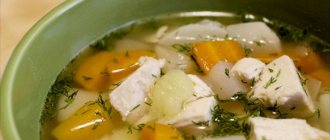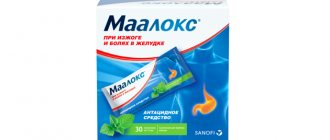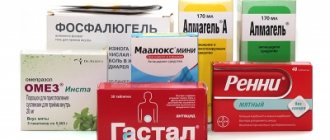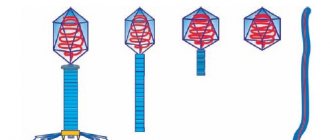Pancreatitis is an inflammation of the pancreas that can occur in acute or chronic form. The disease is accompanied by a violation of the outflow of secretions from the organ, as a result of which enzymes begin to destroy gland cells, and the digestion of food in the intestines practically stops. To stop this process, experts treat pancreatitis with medications with various properties: to eliminate symptoms, neutralize enzymes in the gland or replenish their deficiency in the intestines. Particular attention is paid to lifestyle and diet.
Rice. 1
Not only the result of therapy, but also a person’s life depends on how correct the choice of medications is. Incorrectly selected drugs for pancreatitis can nullify the efforts of doctors to save the patient’s life. As a result of improper treatment, necrosis of the pancreas and diabetes mellitus may develop. There are often cases when an abscess forms in an organ, the rupture of which leads to peritonitis, the formation of fistulas between the pancreas and nearby organs. All these diseases are dangerous with a high risk of death or a significant deterioration in the patient’s quality of life.
What tablets can be used for pancreatitis
In case of pancreatitis, tablets are selected taking into account the existing symptoms, and the main purpose of taking them is to unload the pancreas and reduce its activity. Medicines from the following groups help stop the synthesis of digestive enzymes in organs:
- proton pump blockers and H2-histamine receptor inhibitors;
- enzyme preparations with pancreatin;
- myotropic antispasmodics;
- analgesics.
Rice. 2
This set of tools is enough to eliminate the inflammatory process and restore the functions of the pancreas. Drugs of other groups (enterosorbents, heartburn relievers, antibiotics, etc.) are prescribed if necessary or if there are complications.
Receptor and proton pump blockers
This group of drugs does not directly affect the gland, but partially or completely stops the release of hydrochloric acid in the stomach. As a result of a decrease in its synthesis, the pancreas receives a signal that the body does not need digestive secretions. Slowing down the functioning of the organ leads to a faster restoration of its functionality, and the risk of complications is reduced.
Rice. 3
When choosing drugs to reduce the secretion of hydrochloric acid, you can choose drugs that block H2-histamine receptors or inhibit the proton pump.
H2-histamine receptor blockers (“Roxatidine”, “Ranitidine”, “Famotidine” and Lafutidine) stop only one mechanism of hydrochloric acid production in the stomach (such drugs do not affect gastrin and acetylcholine receptors), act for a short time, have side effects and addictive.
Rice. 4
Proton pump inhibitors (“Omeprazole”, “Pantoprazole”, “Rabeprazole” and others) are more effective and safe, do not cause side effects or addiction, act for a long time and stop the formation and release of hydrochloric acid, acting on the lining cells of the stomach walls. Reviews of the effectiveness of these drugs are in most cases positive.
Enzyme preparations
Enzymes are indispensable medicines for pancreatitis, which allow you to restore the digestion process and relieve the pancreas. Medicines for pancreatitis in this group are represented by tablets with pancreatin, including herbal origin (Pancreatin, Mezim Forte, Peppaza, Wobenzym) and acid-resistant capsules with programmed release microgranules (Creon, Ermital, Mikrazim ").
Rice. 5
When choosing enzyme preparations, not only the dosage of active substances plays a role. Experts pay attention to the course of the disease, the causes of its occurrence, the presence of concomitant diseases or intolerance to individual components.
Important! Tablets containing bile, turmeric extract and simethicone are contraindicated for pancreatitis, as they not only compensate for the lack of enzymes, but also enhance their synthesis in the pancreas, provoking increased inflammation.
Gastroenterologists call the most effective and safe drugs suitable for the treatment of pancreatitis:
Rice. 6
- Capsules “Creon”;
- “Ermital” capsules;
- Micrazim capsules.
The listed drugs are used for chronic pancreatitis, as well as for errors in nutrition to prevent exacerbations. Reviews about them are in most cases positive, but the possibility of side effects while taking them cannot be ruled out.
Analgesics and antispasmodics
In case of acute inflammation of the pancreas or exacerbation of a chronic process, it is important to eliminate the pain syndrome. For this purpose, analgesics and antispasmodics are used. The former cope well with the discomfort that arises during primary inflammation. Antispasmodics are recommended for use in pain caused by pressure from cysts, pseudocysts and stones on the gland ducts.
Rice. 7
Recommended analgesics for use in pancreatitis:
- Paracetamol is an effective and safe drug that does not irritate the gastric mucosa and helps reduce inflammation.
- Analgin is a potent drug that is used alone or in combination with antispasmodics.
- Baralgin is a remedy similar in composition and action to Analgin.
Drugs with an analgesic effect are not without drawbacks. They can irritate mucous membranes, cause allergies and affect the functioning of the cardiovascular system, liver and kidneys. Therefore, they are prescribed taking into account the individual characteristics of the patient. However, reviews of these painkillers are more often positive than negative.
If acute pain occurs due to increased pressure in the pancreatic ducts, analgesics will be ineffective. To eliminate symptoms, it is better to use antispasmodics:
- Papaverine is a remedy based on the compound of the same name, which effectively relaxes the smooth muscles that make up the pancreatic ducts.
- Drotaverine is a myotropic antispasmodic that helps restore the patency of the pancreatic ducts during spasm. Has a weak anti-inflammatory effect.
- Mebeverine (Duspatalin) is a drug with a pronounced and long-lasting effect, but it acts primarily on the smooth muscles of the stomach, intestines and bile ducts. Its use is especially useful for secondary pancreatitis that occurs against the background of gallbladder pathologies.
Rice. 8
Each of the listed drugs is positively assessed by patients. In rare cases, reviews contain negative reviews, and often this is caused not by the quality of the drugs, but by their high cost.
Experts note that antispasmodics require strict dosage, as they affect smooth muscles throughout the body, including the myocardium, vascular walls, and bladder. They are not prescribed to patients with low blood pressure, certain types of arrhythmia, or intestinal atony.
Additional funds
In addition to enzyme preparations and painkillers, it is recommended to use prebiotics based on soluble dietary fiber for pancreatitis. They are necessary to restore intestinal microflora and protect the pancreas from excessive stress.
When they enter the digestive tract, fibers absorb fats and glucose, which stimulate the pancreas to intensively produce digestive secretions and insulin. Thanks to this, the gland functions within its capabilities, which allows it to recover faster. In addition, soluble fiber is a good nutrient medium for beneficial microflora, resulting in improved absorption of essential nutrients in the large intestine.
All types of cabbage, citrus fruits, apples, beans and pumpkin, zucchini and carrots, oatmeal, prunes and whole grain bread can be a source of soluble fiber. Unfortunately, most of the listed products are prohibited during an exacerbation, as they cause bloating and stool disturbances. You can replace them with rye bran or psyllium husk. A more convenient and safer option is the Smart Fiber additive. The fiber in it has the structure of a powder that dissolves without a trace in any food and drink, without changing the taste, color or consistency of the dish. It is enough to consume one spoon of the product per day to cover the daily requirement for dietary fiber and get rid of discomfort in the stomach.
Nutritional supplements
Since proteins, sugars, starches, and fats require specific types of enzymes, it is best to take a product that includes all of these types.
Many experts believe that the most effective are drugs that contain a full range of enzymes that improve digestion. Look for supplements that include the following enzymes:
- alpha-galactosidase (derived from the fungus Aspergillus nigra and is thought to aid in the digestion of carbohydrates).
- amylase (produced by the salivary glands)
- cellulase
- glucoamylase
- invertase
- lactase
- lipase
- malt-diastase
- protease (or acid protease)
- beta-glucanase
- pectinase
- phytase
When selecting enzymes, we recommend following the following guidelines based on symptoms and current health:
- If you have problems with the gallbladder and are looking for a natural remedy for its treatment, then pay attention to preparations containing lipase and bile salts.
- In preparations containing betaine hydrochloride, pepsin is certainly present.
- Some medications may contain lactase, which until recently could only be purchased as a separate medication. This enzyme helps people who have problems absorbing sugar from dairy products.
- Preparations with protease help digest protein. They will be especially useful for people with autoimmune and inflammatory diseases.
- Blends with added herbs such as peppermint and ginger also support digestion.
- Some people require more pancreatic enzymes than others. For this reason, choose a drug based on your personal needs. Most foods contain some amount of pancreatin, which is a combination of three pancreatic enzymes.
How to choose the right medications for pancreatitis
Only the attending physician can make the right choice when treating pancreatitis with tablets and soberly assess which of them is better. Even the most expensive and modern medicine may not be suitable for a number of reasons: due to concomitant diseases, intolerance, and characteristics of the body.
A remedy that worked for a neighbor, relative, or friend may cause serious complications for you. Lack of effect is the least that can happen when taking the wrong medicine. Symptoms of pancreatitis may well be accompanied by problems with the heart, brain, and circulatory system. Therefore, the choice of remedy can only be entrusted to a gastroenterologist.
To reduce all possible risks, you need to tell your doctor about all diseases, drug intolerances and allergies (if any), recent or existing diseases. It is also worth talking about what medications are taken regularly, even if they are vitamins or dietary supplements. This information will help you choose effective and safe products in the right dosage.
Are there food enzymes for vegetarians?
Some preparations contain only enzymes of plant origin, which are quite suitable for vegetarians and vegans. They typically contain bromelain, derived from pineapple, and papain, from papaya.
Products formulated specifically for vegans typically contain pancreatin, which is derived from the fungus Aspergillus niger. The most common source of this enzyme is bovine or pig bile.
In addition, some preparations additionally contain herbs and spices. They often contain amla extract, which is not an enzyme, but is used in Ayurvedic medicine as an herbal remedy to improve overall health. It is believed to work in synergy with other compounds.
Why is the pancreas needed?
First of all, it produces digestive enzymes
necessary for digesting food. These are proteases that are involved in the digestion of proteins, lipases that break down fats and amylases - enzymes that help digest carbohydrates.
The ABCs of healthy eating
20 simple facts about how to eat right will help you build a balanced diet for health and well-being.
In addition, the pancreas is an internal secretion organ.
It produces the hormones glucagon and insulin
, which are necessary to maintain normal blood sugar levels.
Use in Traditional Chinese Medicine and Ayurveda
Traditional medicine takes a holistic approach to treating digestive problems, which involves changes in diet and lifestyle rather than drugs. Digestive enzymes in drug form only became available 50 years ago. Previously, patients were advised to include more raw foods and foods containing probiotics in their diet.
According to the ancient medical system of Ayurveda, digestion depends on the amount of Agni, the “digestive fire.” It is believed that Agni can be increased by eliminating the causes of indigestion (for example, eating under stress or shortly before sleep), adjusting the diet and strengthening the digestive organs with the help of herbs and home remedies.
In Ayurveda, spices play an important role in supporting digestion. The following are considered especially healing:
- ginger
- turmeric
- caraway
- coriander
- fennel
- cardamom
- fenugreek
- cinnamon
- rosemary
- sage
- oregano
Beet juice removes toxins and improves performance
To increase the amount of digestive fire, you need to drink herbal tea, which promotes the functioning of enzymes. This tea can be prepared by pouring boiling water over cumin, coriander and fennel (1/3 teaspoon each). The drink must be strained before drinking. Eating papaya can also be beneficial as it contains papain, which helps relieve inflammation.
In Traditional Chinese Medicine, digestion is governed by Qi, “vital energy.” Acupuncture, herbs, movement and stress relief combined with plant-derived enzymes from foods can help improve digestion and manage ailments.
To support digestion, raw fruits and vegetables that have been slightly processed are most often recommended.
Other methods that improve the condition of the gastrointestinal tract include:
- eating local/seasonal foods
- eating organic, unprocessed, non-GMO foods
- limiting sugar intake, liquids during meals and cold foods
- chewing food thoroughly
- refusal to eat 2-3 hours before bedtime
- doing yoga, tai chi, stretching and other forms of exercise to increase appetite
When should you take digestive enzymes?
For optimal results, digestive enzymes should be taken 10 minutes before meals or with your first bite. Protease supplements can be taken between meals in combination with other enzymes.
Start with twice daily and adjust dosage as needed.
Can I take probiotics and digestive enzymes at the same time?
Yes, enzymes should be taken before meals, and probiotics after or between meals.
It is beneficial to get probiotics from fermented foods. For example, yoghurt, kefir, kimchi or sour cream. Probiotics help normalize the gut microbiome, aiding digestion and reducing symptoms such as gas and bloating.
Benefit for health
What are the benefits of digestive enzymes? Mainly because they help digest food. Enzymes should be taken for the following reasons:
- Help treat leaky gut and other conditions by relieving tension in the gastrointestinal tract.
- Maintains a healthy balance of bacteria in the intestines.
- Helps the body break down difficult-to-digest proteins and sugars, such as gluten, casein and lactose (milk sugar).
- Significantly reduces the symptoms of acid reflux and irritable bowel syndrome.
- Improves nutrient absorption, preventing the development of deficiencies.
- Naturally blocks the action of enzyme inhibitors found in foods such as nuts, wheat germ, egg whites, seeds, beans and potatoes.
If you lack digestive enzymes, you may experience constipation. In this case, taking additional enzymes may help. Digestive enzymes are not associated with weight loss and cannot be used for weight loss. However, they can help eliminate cravings for certain foods and help you feel full more quickly.











